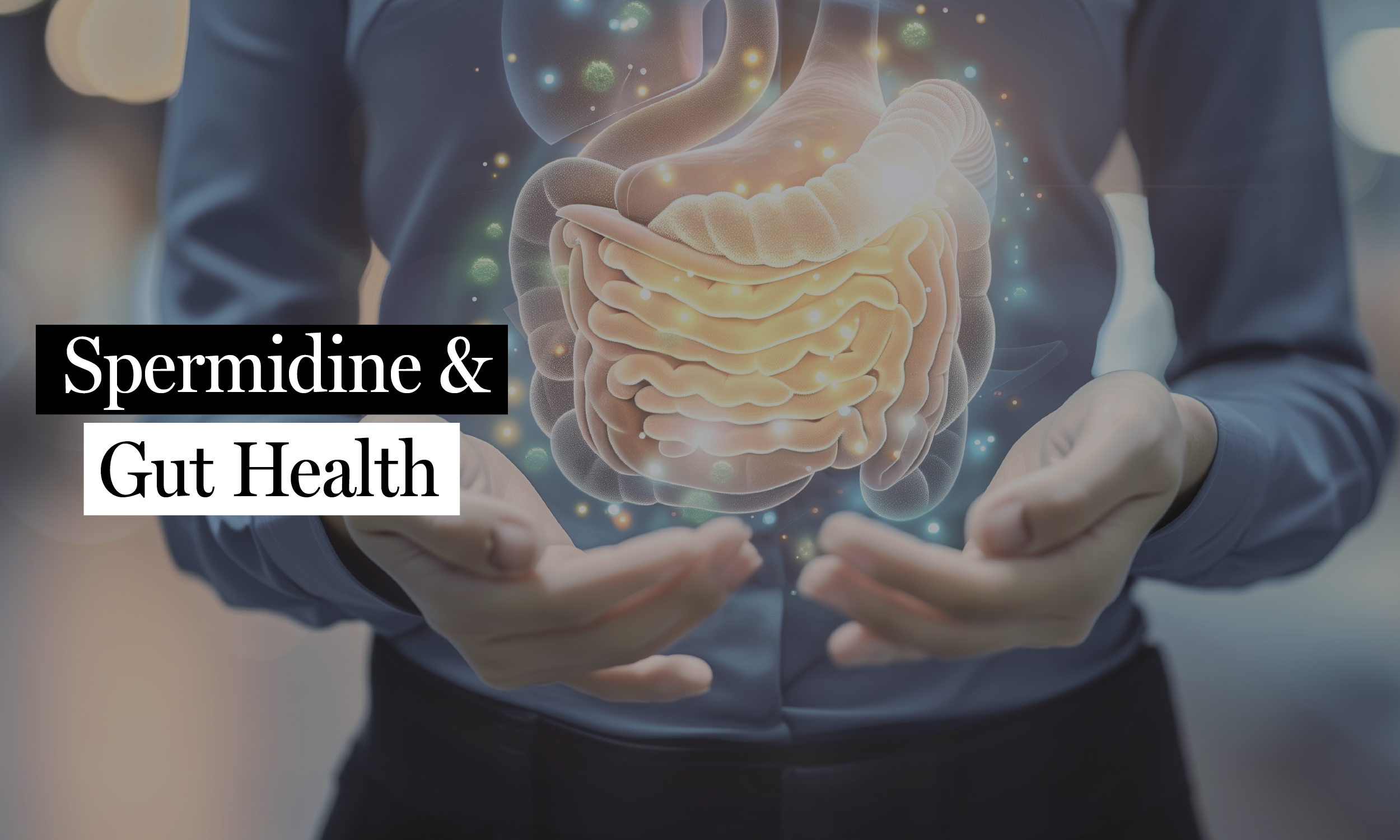
Aging represents the cumulative failure of maintenance systems that keep cells, tissues, and organs in balance, a complex biological process in which the gut microbiota plays a central role. Emerging research reveals that shifts in microbial composition can influence cellular repair, metabolic resilience, and inflammation, while the polyamine spermidine acts as a critical mediator of these gut–cellular interactions. Understanding this interplay opens new avenues for strategies that can promote both lifespan and healthspan.
The Gut Microbiome: A Key Player in Aging and Age-Related Diseases
The gut microbiota refers to the trillions of microorganisms (bacteria, viruses, fungi, and archaea) residing in the gastrointestinal tract. The gut microbiome encompasses these microbes plus their genes, metabolic products, and functional interactions. Together, they regulate metabolism, immunity, and overall health.
However, as we age, this ecosystem undergoes significant changes, often resulting in dysbiosis, an imbalance in the gut microbial community:
- Reduced microbial diversity: Aging decreases the variety of gut bacteria, which can impair resilience and stability.
- Loss of beneficial bacteria: Species such as Faecalibacterium prausnitzii, Clostridium butyricum, and Bifidobacterium tend to decline, while opportunistic and potentially harmful bacteria may increase.
- Rise of pro-inflammatory microbes: Aging promotes a state of chronic low-grade inflammation, the so-called inflammaging, contributing to age-related diseases.
- Decline in metabolite production: Aging reduces the gut microbiota’s ability to produce beneficial compounds like polyamines including spermidine, short-chain fatty acids, and vitamins.
These age-related changes in the gut microbiome are closely linked to a range of age-related diseases:
- Neurodegenerative disorders: Alzheimer’s disease and Parkinson’s disease risk increases due to dysbiosis and neuroinflammation.
- Metabolic disorders: Obesity, type 2 diabetes, and non-alcoholic fatty liver disease (NAFLD) are linked to microbial imbalances and altered energy metabolism.
- Cardiovascular diseases: Dysbiosis can elevate harmful metabolites like trimethylamine N-oxide (TMAO), promoting atherosclerosis and hypertension.
- Osteoporosis: Impaired gut health reduces calcium and vitamin D absorption, affecting bone density.
- Cancer: Chronic inflammation and dysbiosis increase colorectal and systemic cancer risks.
- Cognitive and mental health disorders: Dysbiosis affects neurotransmitter production, contributing to depression, anxiety, and cognitive decline.
- Immune system dysfunction: Immunosenescence and chronic inflammation are exacerbated by altered gut microbiota.
- Gastrointestinal disorders: Irritable bowel syndrome (IBS), inflammatory bowel disease (IBD), and diverticulitis worsen with microbial imbalance.
- Frailty and sarcopenia: Reduced nutrient absorption and inflammation contribute to muscle loss in older adults.
Maintaining a diverse and balanced gut microbiota through diet, prebiotics, probiotics, healthy lifestyle choices, and supplementation with spermidine can help reduce these risks and promote healthy aging. In fact, centenarians often have gut microbiota profiles resembling those of people decades younger, highlighting that a well-maintained gut ecosystem and adequate spermidine levels may be key factors in longevity.
The Gut-Aging Connection: Why Spermidine Matters
Spermidine is a naturally occurring polyamine found in all living organisms that plays critical roles in:
- Autophagy (cellular “clean-up” and renewal)
- DNA and mitochondrial function
- Anti-inflammatory and antioxidant defenses
- Tissue repair and regeneration.
By improving overall cellular health, spermidine contributes to longevity and helps reduce age-related disorders. Unfortunately, spermidine levels decline with age, which may exacerbate inflammation, metabolic dysfunction, and the risk of age-related diseases.
We get spermidine from three main sources:
- Food – found in mushrooms, soybeans, and fermented foods, to name a few!
- Our own cells – producing spermidine internally.
- Gut bacteria – synthesizing it from dietary precursors.
This balance highlights why maintaining a healthy and diverse gut microbiota is so critical for sustaining optimal spermidine levels as we age.
Among the gut bacteria responsible, species including Bifidobacterium, Lactobacillus, Bacteroides, Akkermansia muciniphila, Faecalibacterium prausnitzii, and others such as Clostridium, Enterococcus, Pediococcus, Streptococcus, Bacillus, Ruminococcus, and E. coli contribute to spermidine production through interconnected metabolic pathways, including the N-carbamoylputrescine pathway. Beneficial bacteria like Faecalibacterium prausnitzii, Ruminococcus, and Clostridium butyricum play especially important roles. These microbes utilize dietary precursors such as arginine, ornithine, and putrescine, converting them into spermidine. Spermidine is then absorbed in the gut and distributed systemically, supporting cellular function, autophagy, and longevity. Importantly, spermidine synthesis often requires collaborative interactions among different bacterial species, highlighting the networked nature of the gut microbiota.

The Virtuous Cycle of Spermidine and Gut Health
As we age, shifts in the gut microbiota reduce the number of beneficial bacteria producing spermidine. This leads to lower overall spermidine synthesis and contributes to inflammation, metabolic dysfunction, and increased disease risk. Maintaining or enhancing spermidine levels (through diet, prebiotics, probiotics, or supplementation) can not only restore microbial balance but can also create a virtuous cycle:
- A healthy gut microbiome produces spermidine.
- Spermidine, in turn, supports the growth of beneficial bacteria.
- Together, they reduce inflammation, protect cells, and promote resilience during aging.
How Spermidine Supplementation Supports Gut Health
Research shows that spermidine supplementation can positively influence the gut microbiome:
- Increases polyamine levels: Supports gut barrier integrity and cellular functions.
- Enhances gut mucosal health: Improves nutrient absorption and immune defense.
- Modulates microbiota composition: Enriches beneficial bacteria like Bifidobacterium and Lactobacillus and reduces harmful bacteria (like Clostridium difficile or Prevotella copri) .
- Reduces inflammation: Mitigates age-associated gut inflammation.
- Strengthens gut barrier function: Reduces metabolic endotoxemia and supports overall gut health.
In short: supporting spermidine levels helps restore a healthy microbiota and keeps the virtuous cycle turning.
Conclusion: Targeting the Gut for Healthy Aging
The gut–spermidine connection is emerging as an exciting area of longevity research. Strategies to modulate the microbiome, including probiotics, prebiotics, dietary precursors, microbiota engineering, and spermidine supplementation, can restore microbiota balance, boost spermidine levels, and reinforce the cellular processes underlying healthy aging.
Supporting a healthy gut through these approaches could not only extend lifespan but also enhance healthspan, allowing us to age with vitality, resilience, and reduced risk of age-related diseases. By nurturing our microbiota and harnessing the power of spermidine, we can tap into a self-reinforcing system that influences the aging process at its root.







